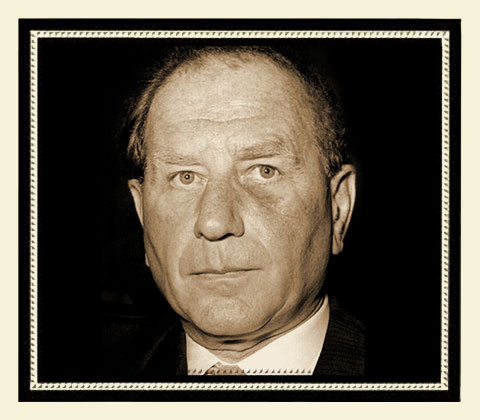Gleiwitz, Silesia, now Gliwice, Poland, 1897 — Tuscany, Italy, 1995
Publisher
One of the greatest German publishers of all time, Gottfried Bermann served as an officer in the First World War, before studying medicine and working as assistant surgeon. In 1926 he married Brigitte Fischer, daughter of the publisher Samuel Fischer, who encouraged his son-in-law to join his publishing house – at the time Germany’s largest publisher of fiction. Three years later Bermann was already general manager and in 1932 he founded a copyright society in Switzerland, through which he managed to protect many authors from abuse by the Nazis.
Many of the publisher’s titles were included in the book burnings promoted by the Nazi regime in 1933. Samuel Fischer died in 1934 and the following year Bermann decided to split the company, leaving part in Germany under the direction of Peter Suhrkamp and transferring the other half, with the more polemic authors, to Vienna, where he went to live with his wife and three daughters. There he managed to reprint authors who had already been banned, such as Thomas Mann, Hugo von Hofmannsthal, Hermann Hesse, Mechtilde Lichnowsky and Carl Zuckmayer, until he was forced to flee to Switzerland via Italy, and later to Sweden, where he founded his publishing house Bermann-Fischer. There, he published German and Austrian authors like Stefan Zweig himself. However, when sympathies for the Nazi regime began to be felt even in Sweden, with Bermann himself spending five weeks in jail, the family emigrated to the United States, in 1940. In 1941, the German edition of Brazil, Land of the Future was still published in Stockholm by Bermann-Fischer Verlag.
After the Second World War Bermann-Fischer returned to run the company in Stockholm from 1948, together with Fritz H. Landshoff, director of a department of the Amsterdam publishing house Querido (1933–1940), which was also devoted to supporting authors persecuted by Nazism. When Bermann returned to Germany in 1950 he broke ties definitively with Peter Suhrkamp, who had managed to keep the company going throughout the Nazi regime and had even been interned in a concentration camp. The authors had to choose between the publishers Bermann-Fischer and Suhrkamp.
Gottfried Bermann-Fischer retired in 1963, devoting his time to tennis, sculpture and painting. In his last interview he declared: “My mission in life was twofold: keeping the publishing house alive and running it according to tradition, and protecting my family from being annihilated by the Nazi regime. The fact that I managed both fills me with infinite gratitude.” Gottfried Bermann-Fischer died in Tuscany at the age of 98. He is buried at the Jewish Cemetery in Berlin-Weissensee.
Until 2014, when Zweig’s work fell into the public domain, S. Fischer Verlag retained exclusive publication rights in the German language, and even since then has continued to be the main vehicle for correspondence, diaries and biographies.
Address listed: Verlag: s.L.B. Fischer Publ. Corp. Old Greenwich, Conn. Tel. Old Greenwich 7-0409
